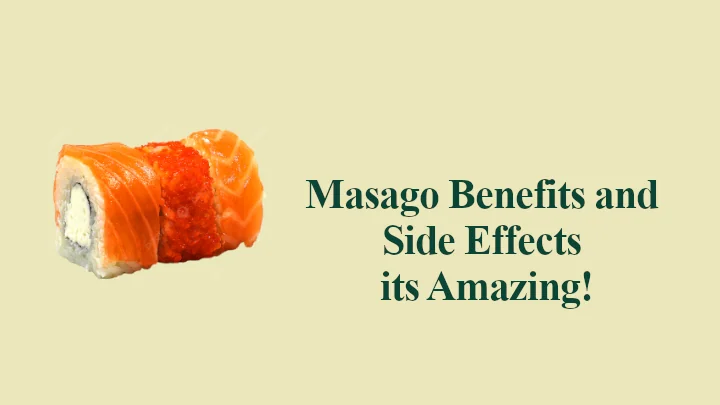Masago Benefits and Side Effects its Amazing!

Looking for Masago Benefits and Side Effects? Masago, often known as capelin roe, is a type of fish egg widely used in Japanese cuisine, particularly in sushi. It is known for its tiny, crunchy texture and mild flavor, adding a delightful touch to many dishes.
But beyond taste, masago has its own set of health benefits and potential side effects. This guide will help you understand both the good and the bad of masago in a simple way.
What is Masago?
Masago is the small, edible eggs of the capelin fish, a small fish found in cold oceans around the world. These tiny orange eggs have become popular in dishes such as sushi rolls, salads, and other Japanese-inspired recipes. Their bright color and crunchy texture make masago a fun addition to food, while also adding flavor.
Health Benefits of Masago
1.Rich in Nutrients
Masago is packed with essential nutrients. It’s a good source of protein, healthy fats, and minerals. Here’s a quick look at some key nutrients in masago:
Protein: Helps build and repair body tissues, making it essential for muscles and overall health.
Omega-3 Fatty Acids: These are healthy fats that benefit the heart and brain.
Vitamins: Masago contains vitamin B12, which is important for nerve health, and vitamin D, which supports bone health.
Minerals is also rich in phosphorus, magnesium, and selenium, all of which are important for different functions in the body.
2. Good Source of Protein
Masago is an excellent source of lean protein, meaning it’s low in fat and high in protein. Protein is essential for muscle growth, repairing tissues, and producing important enzymes and hormones. For those who want to increase their protein intake without adding too much fat, masago can be a good option.
3. Rich in Omega-3 Fatty Acids
Omega-3 fatty acids are healthy fats that benefit the heart and brain. They help reduce inflammation in the body, lower the risk of heart disease, and can even support mental health by reducing symptoms of depression and anxiety.
Since omega-3s are mostly found in seafood, masago can be a great way to add these healthy fats to your diet.
4. Antioxidant Properties
Masago contains antioxidants, such as selenium, which help protect cells from damage. Antioxidants can slow down aging and reduce the risk of certain diseases by protecting the body from harmful molecules called free radicals.
5. Low in Calories
If you’re looking to enjoy a tasty food without a lot of calories, masago is a good choice. It is naturally low in calories, making it a good topping option for those who are watching their calorie intake but still want to enjoy flavorful foods.
Side Effects of Masago
While masago has some amazing benefits, it’s also important to know about its potential side effects.
1. High in Sodium
Masago has a high salt content, which is common in many types of fish roe. Eating too much salt can lead to high blood pressure and increase the risk of heart disease over time. People who are sensitive to salt or have high blood pressure should consume masago in moderation.
2. Risk of Allergies
Masago is seafood, and seafood allergies are fairly common. If you are allergic to fish or shellfish, masago could trigger a reaction, which can range from mild to severe.
Symptoms of an allergic reaction include itching, swelling, hives, and in severe cases, difficulty breathing. Always check for allergies before trying new foods, especially seafood.
3. Contains Environmental Pollutants
Since masago comes from fish, it can contain trace amounts of environmental pollutants, such as mercury and other heavy metals.
Although capelin fish (the source of masago) tend to have lower levels of these pollutants than larger fish, it is still important to consume it in moderation, especially for pregnant women and young children.
4. May Be High in Cholesterol
Like many other animal-based foods, masago contains cholesterol. While moderate consumption is generally safe, those with high cholesterol or heart-related health conditions may want to limit how much masago they eat. High cholesterol levels can contribute to heart disease if not managed properly.
5. High in Purines
Masago contains purines, which are compounds that break down into uric acid in the body. For people with gout or those prone to kidney stones, foods high in purines should be limited because they can worsen these conditions.
If you have gout or are at risk for kidney problems, it’s best to consult a doctor before adding masago to your diet.
How to Safely Enjoy Masago
Despite some potential side effects, you can still enjoy masago by keeping a few simple guidelines in mind:
1. Limit Your Intake
Since masago is high in sodium, cholesterol, and purines, it’s best to enjoy it in moderation. This means eating it occasionally as a treat rather than making it a daily part of your diet.
2. Watch for Allergic Reactions
If you’re new to eating masago, start with a small amount and watch for any signs of an allergic reaction, especially if you have a history of seafood allergies.
3. Pair with Healthy Foods:
Add masago to salads, sushi, or low-sodium dishes to balance out its high salt content. Pairing it with vegetables and other healthy foods can make it part of a balanced meal.
Conclusion
Masago can be a delicious addition to meals, especially if you enjoy Japanese cuisine. It offers several health benefits, including protein, omega-3 fatty acids, and antioxidants, which can support heart, brain, and overall health.
However, because it is high in sodium, cholesterol, and purines, it’s best to eat masago in moderation. By doing so, you can enjoy the flavor and health benefits while minimizing potential side effects.
Whether you’re a fan of sushi or just exploring new foods, masago can be a flavorful ingredient worth trying in small, balanced amounts. Always remember to check for allergies and consult a healthcare professional if you have any concerns about adding masago to your diet.





